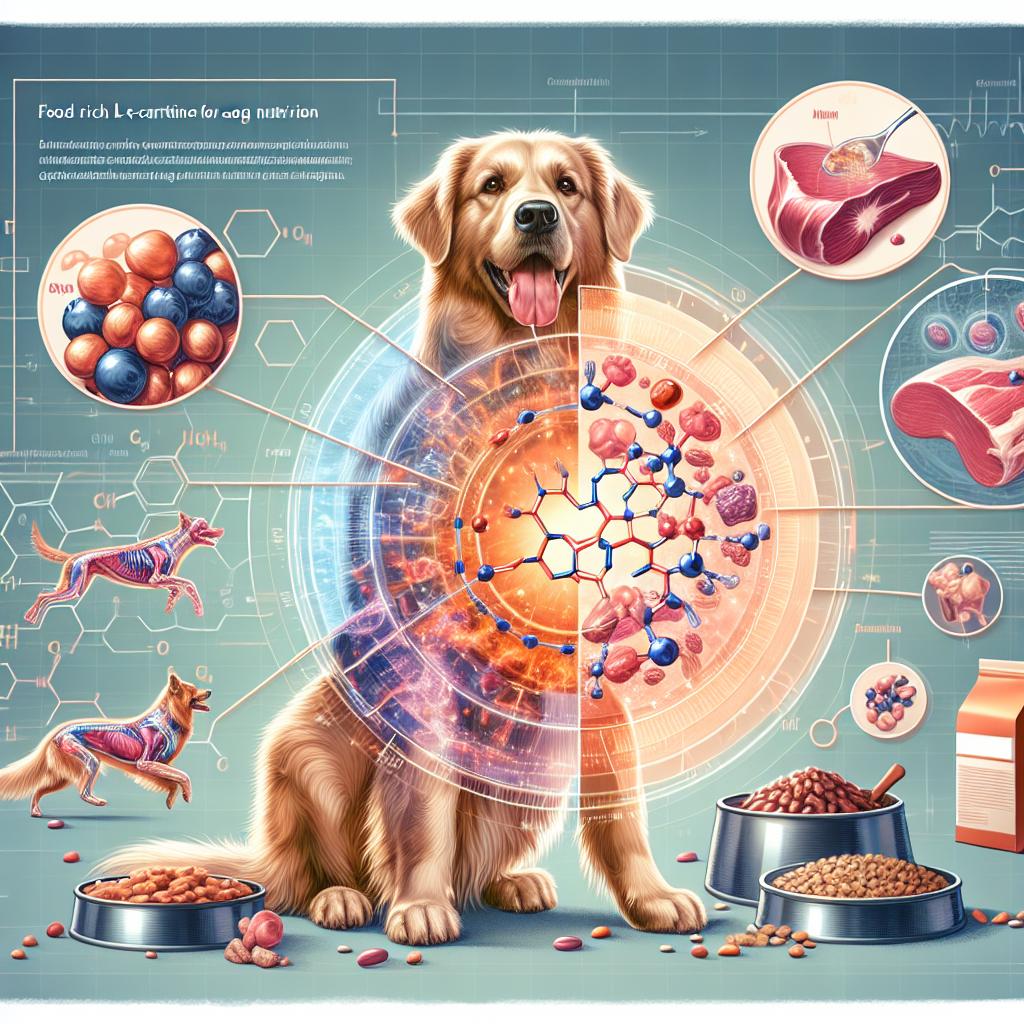In the ever-evolving world of canine nutrition, pet owners are increasingly on the hunt for supplements that can enhance their furry companions’ health and vitality. Among the myriad of options available, L-Carnitine has emerged as a fascinating player, garnering attention for its potential benefits in canine diets. This naturally occurring compound, primarily known for its role in fat metabolism and energy production, is not just a human health supplement; it holds promise for our four-legged friends as well. As we delve deeper into the role of L-Carnitine in dog nutrition, we will explore its origins, mechanisms, and the potential advantages it may offer to dogs of all ages and activity levels. Whether your pooch is a competitive athlete or a leisurely couch companion, understanding the implications of L-Carnitine can pave the way for informed nutritional choices that contribute to their overall well-being. Join us on this exploration of L-Carnitine’s place in canine health, as we uncover how this supplement can help support a long, active, and healthy life for our beloved pets.
Understanding L-Carnitine and Its Importance in Canine Diets
L-Carnitine is a naturally occurring compound that plays a pivotal role in energy production by facilitating the transportation of fatty acids into the mitochondria of cells. In canines, this is particularly important as their energy needs vary based on age, activity level, and overall health. By enhancing fat metabolism, L-Carnitine not only aids in maintaining a healthy weight but may also improve stamina during exercise. Regular inclusion of L-Carnitine in a dog’s diet can support optimal energy levels, making it a valuable nutrient for both active pets and those needing weight management.
In addition to its energy-boosting properties, L-Carnitine has several other benefits that promote canine well-being. These include:
- Heart Health: L-Carnitine supports cardiovascular function by improving blood circulation and reducing the risk of heart disease.
- Muscle Preservation: It helps decrease muscle degeneration, especially in aging dogs, ensuring they remain active and mobile.
- Enhanced Cognitive Function: Some studies suggest that L-Carnitine may aid cognitive abilities, particularly in older dogs facing mental decline.
| Benefit | Description |
|---|---|
| Energy Production | Facilitates the transport of fatty acids for energy. |
| Weight Management | Aids in fat metabolism for maintaining a healthy weight. |
| Muscle Health | Supports muscle preservation and recovery. |

Health Benefits of L-Carnitine for Dogs: From Weight Management to Energy Levels
L-Carnitine is an amino acid derivative that plays a crucial role in a dog’s metabolism, particularly in the transportation of fatty acids into the mitochondria for energy production. This process is vital for weight management, especially in overweight or less active dogs. By converting fat into usable energy, L-Carnitine helps maintain a healthy weight and can prevent obesity-related health issues. Additionally, it promotes muscle development while preserving lean body mass, making it a valuable supplement for both active dogs and those undergoing a weight-loss program.
Beyond its weight management benefits, L-Carnitine is linked to enhanced energy levels. Dogs that receive adequate amounts of this nutrient tend to exhibit increased stamina and reduced fatigue during physical activities. This is particularly beneficial for athletic or working dogs that require peak performance. Some of the key benefits include:
- Boosted endurance during activities and playtime
- Improved recovery time after exercise
- Enhanced overall vitality and mood
By incorporating L-Carnitine into your dog’s diet, you may notice a significant improvement in their energy levels and overall well-being.

Incorporating L-Carnitine into Your Dogs Nutrition Plan
Incorporating L-Carnitine into your dog’s nutrition plan can yield numerous health benefits, particularly for canine fitness and vitality. To ensure your furry companion receives the optimal dosage, consult with your veterinarian as individual needs may vary based on age, breed, and health status. Here are some effective ways to integrate L-Carnitine into their diet:
- Supplements: Available in liquid, tablet, or powder form, these can be easily added to your dog’s meals.
- High-Quality Dog Foods: Many premium dog food brands now include L-Carnitine as part of their ingredients, promoting muscle health and energy.
- Homemade Diets: If you prepare your dog’s meals, consider adding natural sources rich in L-Carnitine such as lean meats, particularly beef, and chicken.
When adding L-Carnitine to your dog’s meals, monitoring their reactions and overall energy levels is important. Depending on your dog’s size and dietary requirements, the recommended dosages may differ. Below is a simple table summarizing suggested L-Carnitine dosages based on your dog’s weight:
| Dog Weight (lbs) | Recommended Dosage (mg) |
|---|---|
| 5-20 | 250-500 |
| 21-50 | 500-1000 |
| 51-100 | 1000-1500 |
Integrating L-Carnitine doesn’t just support physical health; it also promotes mental well-being by maintaining energy and overall vitality in dogs. As your dog ages, ensuring their diet reflects their evolving nutritional needs—including optimal levels of L-Carnitine—can contribute significantly to their quality of life.

Choosing the Right Sources of L-Carnitine for Optimal Canine Health
When it comes to selecting L-Carnitine sources for your dog’s diet, it’s essential to prioritize quality and efficacy. Look for natural sources that have a high bioavailability to ensure your canine reaps the full benefits. Top sources include:
- Animal Proteins: Beef, chicken, and fish are excellent options, rich in L-Carnitine.
- Supplements: Quality supplements made specifically for dogs can provide concentrated doses.
- Whole Grains: While less potent, whole grains such as brown rice can contribute to L-Carnitine intake.
Identifying trustworthy products is equally vital. Review ingredient lists and opt for those with minimal fillers. Additionally, consider lab-tested formulations that guarantee purity and potency. Here’s a simple comparison of common L-Carnitine sources:
| Source | Bioavailability | Recommended Use |
|---|---|---|
| Beef | High | Daily meals |
| Chicken | Moderate | As a protein source |
| L-Carnitine Supplement | Very High | As directed by a vet |
| Fish | High | Weekly incorporation |
Q&A
Q&A: The Role of L-Carnitine in Dog Nutrition
Q1: What exactly is L-Carnitine, and why is it important for dogs?
A1: L-Carnitine is a naturally occurring compound that plays a key role in the metabolism of fatty acids in the body. It assists in the transport of long-chain fatty acids into the mitochondria, the powerhouse of the cell, where they are converted into energy. For dogs, L-Carnitine can be vital for maintaining optimal energy levels, especially in active breeds, growing puppies, and senior dogs who may benefit from enhanced energy metabolism.
Q2: How can L-Carnitine benefit my dog’s health?
A2: L-Carnitine offers a variety of potential health benefits for dogs. It supports heart health by promoting efficient energy use in cardiac tissues, can help maintain a healthy weight by optimizing fat oxidation, and plays a role in muscle recovery post-exercise. Additionally, it may be particularly beneficial for senior dogs who struggle to maintain muscle mass, as it can help mitigate age-related declines in physical condition.
Q3: Are there specific conditions or breeds that may require additional L-Carnitine in their diet?
A3: Certain breeds, particularly active and muscular ones like Greyhounds and Border Collies, may naturally require more L-Carnitine due to their high energy demands. Additionally, dogs with specific health issues, such as cardiomyopathy, obesity, or metabolic disorders, may benefit from enhanced L-Carnitine levels. Always consult your veterinarian for personalized advice regarding your dog’s dietary needs.
Q4: How can I ensure my dog is getting enough L-Carnitine?
A4: L-Carnitine can be found in various foods. In dog nutrition, it’s commonly sourced from animal products, particularly red meats and dairy. Many commercially prepared dog foods already contain adequate levels of L-Carnitine, especially those formulated for high energy or senior dogs. If you’re considering supplementation, it’s best to discuss this with your veterinarian to determine appropriate dosage and suitability for your dog’s specific health needs.
Q5: Are there any risks associated with too much L-Carnitine in a dog’s diet?
A5: While L-Carnitine is generally considered safe, over-supplementation can lead to gastrointestinal issues, such as diarrhea or nausea. In rare cases, excessive amounts may cause more serious health concerns. To avoid risks, it’s crucial to stick with recommended dosages and consult your veterinarian if you’re considering adding L-Carnitine supplements to your dog’s regimen.
Q6: Beyond L-Carnitine, what other nutrients are essential for a dog’s diet?
A6: A well-balanced canine diet should include a variety of nutrients, including proteins, fats, carbohydrates, vitamins, and minerals. Essential fatty acids, amino acids, and antioxidants also play significant roles. Each of these components contributes to overall health, supporting everything from a shiny coat to a robust immune system. When considering any additions to your dog’s diet, a holistic view of their nutritional needs will ensure they thrive.
Q7: how does L-Carnitine fit into the bigger picture of dog nutrition?
A7: L-Carnitine serves as a vital piece in the complex puzzle of dog nutrition. While it offers specific advantages in energy metabolism and overall health, it’s imperative to understand that it should complement a well-rounded diet rich in a variety of essential nutrients. When properly incorporated, L-Carnitine can support a dog’s vitality and longevity, helping them lead an active, happy life.
The Way Forward
L-Carnitine emerges as a noteworthy player in the realm of dog nutrition, offering a blend of benefits that support optimal health and vitality for our canine companions. As dog owners and enthusiasts, understanding the role of this nutrient allows us to tailor our pets’ diets more thoughtfully, addressing their unique needs whether they are energetic puppies or wise old companions. While L-Carnitine can contribute to weight management, muscle maintenance, and overall well-being, it’s essential to remember that a balanced diet, coupled with regular veterinary consultations, forms the cornerstone of canine health. As we continue to explore the intricacies of pet nutrition, let us remain informed and dedicated to providing our dogs with the best possible care, ensuring that they lead happy, healthy lives filled with joyous adventures. With the right knowledge and resources, we can make informed choices that enrich our dogs’ lives today and for many tomorrows to come.

